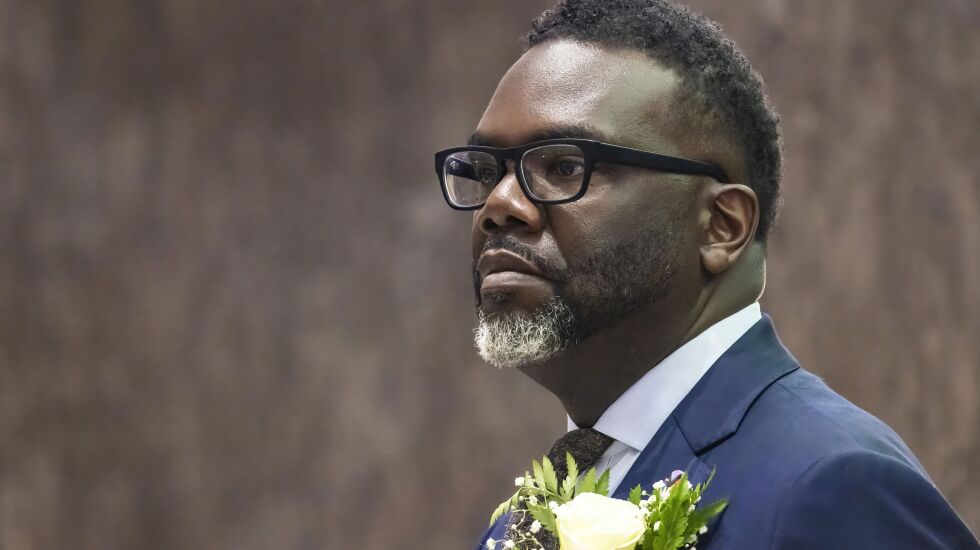
As a candidate running to lead Chicago, Brandon Johnson said police “have no place in schools.” But Chicago Mayor Brandon Johnson is not calling on the Board of Education, which serves at his bequest, to halt the program that stations officers in nearly 40 schools.
At a City Hall briefing, Johnson said he would defer to elected Local School Councils, composed of parents, community members and staff at individual schools, who since 2019 have been responsible for voting on whether to keep their officers.
“I support LSCs and the democratic process that has been established through that particular means of government,” he said.
His comments come a week before a Chicago Board of Education vote on a $10.3 million contract with the Police Department. It is an increase of about $180,000 over last year to pay raises promised in the police union contract.
In response to a Chicago Sun-Times/WBEZ questionnaire during the campaign, Johnson said, “Armed officers have no place in schools in communities already struggling with over-incarceration, criminalization, profiling and mistrust.”
Yet two-thirds of the schools where officers will remain next fall are in those very communities, serving majority-Black and mostly low-income students.
CPS Chief of Safety and Security Jadine Chou said only two LSCs voted this spring to change what is known as the School Resource Officer program. Marshall High School in East Garfield Park voted to remove the lone officer that remained, while Austin High School, also on the West Side, will remove one of two officers. Marshall High School is where police officers in 2019 violently dragged a female student. CPS ultimately paid a $300,000 settlement to the girl’s family.
Those votes leave 39 of 91 Chicago public high schools with police officers; 16 have two full-time cops, while 23 have one. Of those 39 schools, 26 — or two-thirds of the schools with police — have majority-Black student populations. About 48% of CPS high schools are majority Black.
At a briefing Wednesday ahead of next week’s Board of Education meeting, member Elizabeth Todd-Breland said she is concerned about the racial disparity seen in schools choosing to keep their officers.
“We are disproportionately policing Black children in schools, in some buildings, in particular with very low student populations so that you have like a one SRO-to-every-40-student ratio, which is troubling,” she said.
Douglass High School, which had only 28 students last year, has one officer, and Manley, which had 88 students, has two.
Todd-Breland asked why the momentum around removing officers seems to have slowed. In 2019, more than 90% of the city’s traditional 84 public high schools had police officers. By fall 2021, it was about half.
Chou answered by describing it as a “stabilization.”
Chou noted that the pandemic left schools facing a rise in challenging behavior, which might deter schools from removing police.
She said she is also working with the Police Department to establish more mobile police units that patrol outside schools and establish relationships there so they can respond quickly when needed. Once these are in place, Chou thinks more schools will vote to remove the officers stationed inside their buildings.
“What we’ve heard is that schools like that safety, that knowledge of knowing if and when they need a police officer, they will be there,” Chou said. “If that can be met through mobile patrols, they would likely be comfortable in removing their police. Right now they don’t have that guarantee.”
Chou stressed she doesn’t support forcing schools to remove their officers. She said in other school districts that applied a top-down approach, “things go backwards.” The school district also is studying the differences between schools that keep their officers versus ones that remove them, she said.
This seems to be the new approach Johnson is supporting based on his comments Wednesday.
The Chicago Teachers Union, where Johnson was an organizer until becoming mayor, pushed vigorously to get the school board to cancel the police contract. But when the decision was turned over to LSCs the union turned its attention to them. Union officials later said it was good to empower the LSCs, yet said many were so weak they were not effective.
Sarah Karp covers education for WBEZ.







